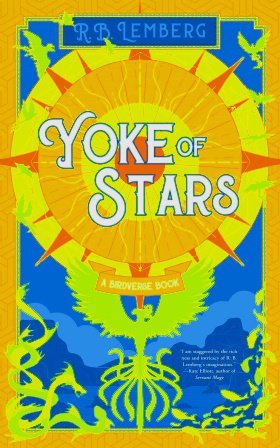She shuddered and whimpered, but I held her, and she stayed.
“Tell me a story of something that matters to you. You owe me that much.”
She whispered, “The stag woman. She was the Kran-Valadar, the queen of the dreamway and nameway hunters I met in the south. She called me beautiful and beloved, and she held me. She called me the wisewoman of the fish people and the singer of their tales, and she taught me the word for woman in the tongue of her people.”
“Kälu.” Ulín’s eyes shine with something like joy as she speaks the word Old Song has given me back then. Woman.
I am shocked to hear it from Ulín’s mouth. “Have you studied the language of the stag people?” I say.
She looks oddly embarrassed, and pleased. “Not as such. A little bit.” She tells me how, in a strange little shop in the middle of nowhere, she bought a dictionary. She studied the stag people’s tongue to compare it to the tongue of the serpents. “I found many similar words in these languages,” Ulín says, her voice warm with pride. “In the tongue of the serpents, woman is kaloy.”
“How many languages did you learn?” Even two had been hard for me.
“There is always so much more to learn,” she says, evasive. Her eyes are bright, and I’m glad she is feeling better.
“Woman,” I say. “In my language, we do not have words like these. Perhaps we had them once, before the Shoal journeyed through the void. But we don’t anymore. There is a person who carries and births from their body, and there are those who do not. This is merely a difference of labor.” I did not birth anyone, so it was not my labor. But back in the prison-cave, Old Song had whispered to me, “I am a coward, Stone. But one day I could be brave. I could choose. To be who I want to be. To be a woman. And you . . . you could be a woman too.”
This thing she had to give. A blessing, a curse, a despair, a rebellion.
For years, I have cherished it.
Ulín breathes deep, her eyes on mine. “I think I am ready to tell you more, now.” Ulín speaks so prettily, I think, even in a language not her own. I struggle with it sometimes.
“Don’t rush,” I say. “You can tell me as much as you can.”
The severing
Ulín went home for a while, to prepare for the wedding. Laufkariar escorted her out of the sea palace. Ulín’s father had sent emissaries. He was suspicious and angry—did the prince of the serpents imprison his daughter under the wave? She told him it was all right.
In a large room overlooking the sea, Ulín met with her parents to make wedding plans. It was chilly, and the windows were open. She inhaled the smell of sea and pines, her skin drinking in the autumn light. How marvelous, to have a room with windows, a room full of air that came in and out. To listen to birdsong. Certainly Laufkariar would allow his bride the pleasure of spending time here, with her family. Perhaps she could still go to the university. She would always return, after all.
Doubt, a small bird, nestled in her ribcage. It was inobtrusive and hidden, and yet it rustled there, turning its delicate beak this way and that. But before Ulín could even name this bird, her father’s anger expanded, choking out air.
“This marriage is wrong,” he said. “I do not trust the serpent people—in peace now, but our ancient enemies—yes, there’s peace now and been for a while, but what reason other than politics is there for such a marriage?”
“I don’t know,” said Ulín’s parent.
“Your mother, or your father?” I ask, to be sure.
“My other parent, Sibeli. They are ichidi. My father is Kannar.”
I nod.
“I don’t know,” Sibeli said. “They could be in love. Laufkariar could love her.”
Ulín’s father replied, “He is seven years her senior. Twenty-six, and they marry young, and he could not find a bride among his people? This is a pile of guano.”

























